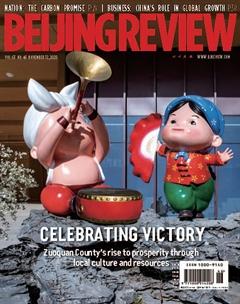The Thought That Counts
By Sarangua Tumur

On October 22, a ceremony was held to hand over the first 4,000 of the 30,000 sheep gifted by Mongolia to China at the border region of Zamiin-UudErlian. They entered China eight months after Mongolian President Khaltmaa Battulga announced the measure to help China fight the novel coronavirus disease (COVID-19) epidemic during his visit to Beijing in February. Following the visit, the two countries agreed to have the delivery after the epidemic receded and the sheep gained weight in autumn.
During the ceremony, Tumen Tegshjargal, Foreign Policy Advisor to the Mongolian President, said, “It is an event that expresses the warmth of the Mongolian people to the Chinese people and brings a positive atmosphere to the relations between the two peoples.”
Chai Wenrui, Chinese Ambassador to Mongolia, responded, saying “Chinese people will not forget this friendship of the Mongolian people. China and Mongolia have a long history of friendly neighbors linked by waters and mountains. The fact that we have understood and helped each other in our fight against the disease reflects the deep idea of the Mongolian old proverb that the lives and spirits of neighbors are the same.”
The donated sheep were collected from herders in three eastern and southern provinces of Mongolia—Khentii, Sukhbaatar and Dornogobi, and received thorough veterinary examinations. Officials said that by the middle of November, the delivery would be concluded.
Sheep diplomacy
During his visit in February, Battulga was warmly welcomed by Chinese President Xi Jinping as the first foreign head of state to visit China since COVID-19 hit the country. The visit and the gift of sheep was reminiscent of ancient traditions and expressed the Mongolian peoples support to the Chinese people to overcome hardship.The gift expresses special considerations and friendship. Traditionally, for Mongolians the sheep is the first choice for giving gifts, implying sincerity and enthusiasm. Also, mutton is the best food for enhancing immunity and they hope that the Chinese can overcome the epidemic as soon as possible.
Mongolians say, “A needle in need is of greater use than a camel in prosperity” as it implies “adversity reveals the quality of friendship.” In response to the remarks made by Battulga during his visit, Xi also quoted ancient Chinese proverbs. He said, “If you have received a drop of beneficence from other people, you should return to them a fountain of beneficence.”

